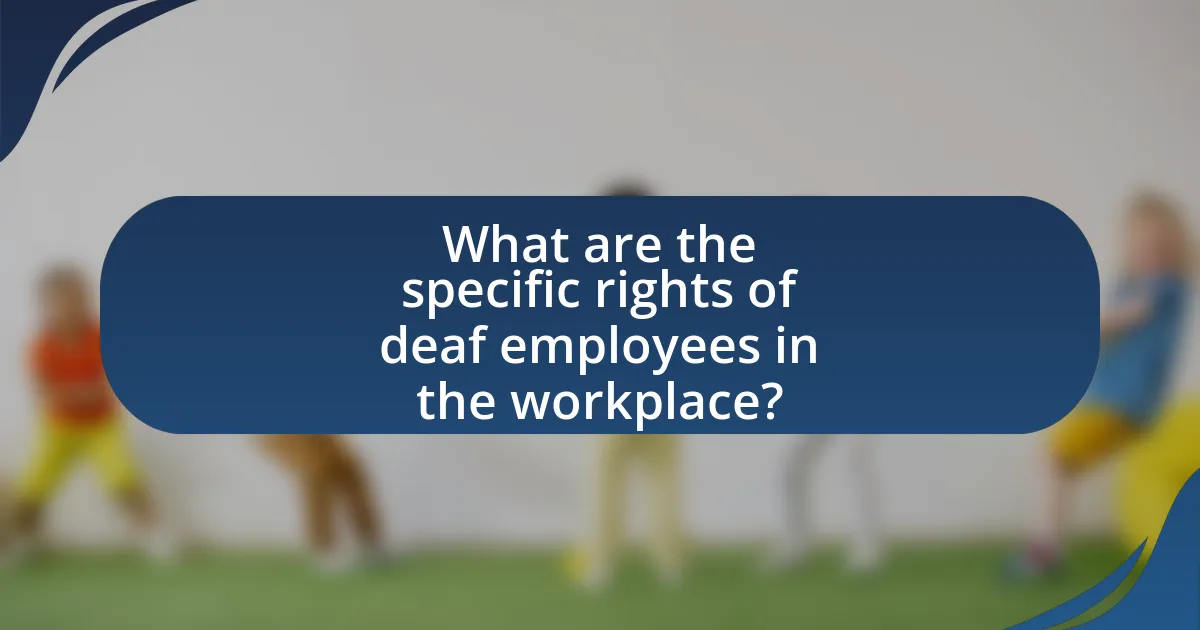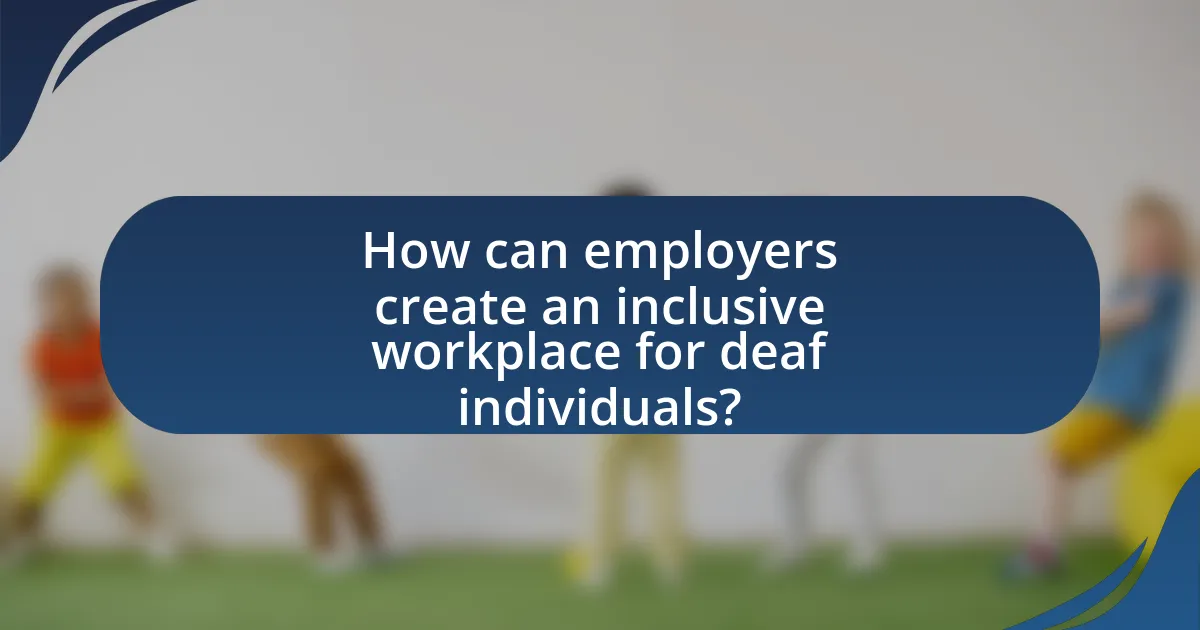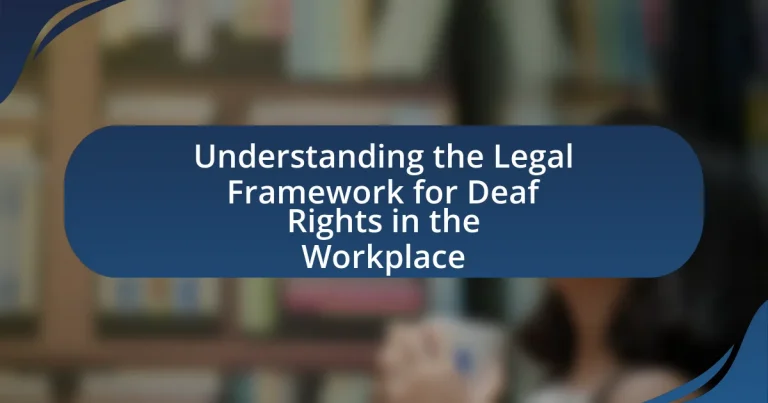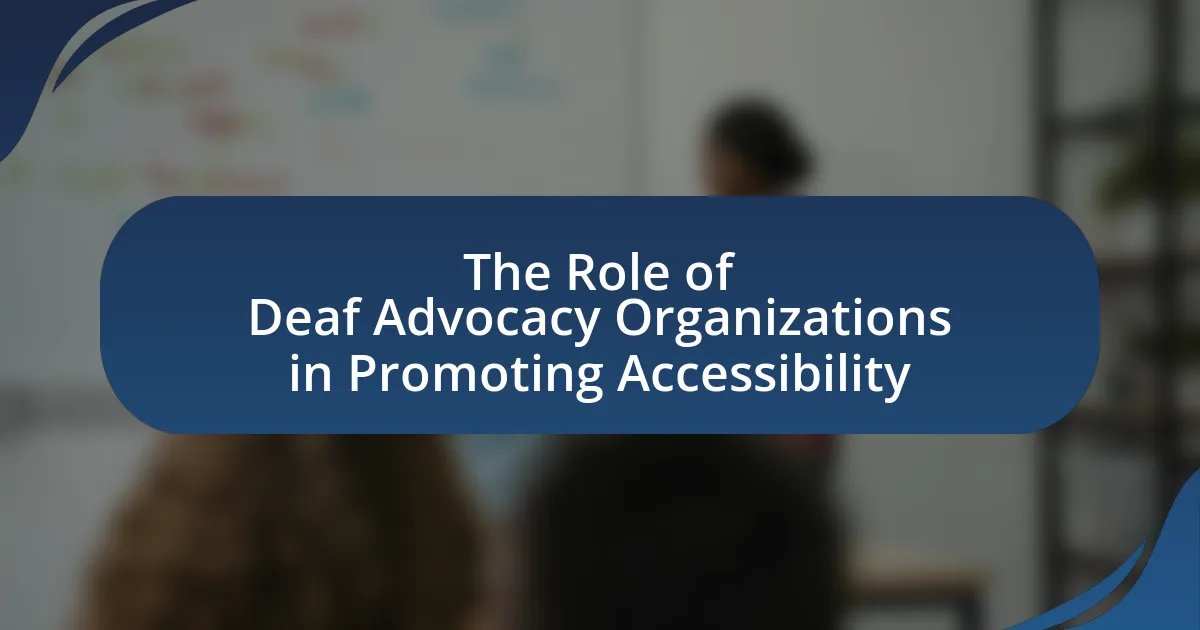The article focuses on the legal framework for deaf rights in the workplace, primarily highlighting the Americans with Disabilities Act (ADA) and the Rehabilitation Act of 1973. It outlines the obligations of employers to provide reasonable accommodations, such as sign language interpreters and assistive technologies, to ensure effective communication for deaf employees. The article also discusses the protections against discrimination, the specific rights of deaf individuals, and the importance of creating an inclusive work environment. Additionally, it addresses the variations in laws across different countries and regions, the potential consequences of non-compliance, and best practices for employers to support deaf employees effectively.

What is the Legal Framework for Deaf Rights in the Workplace?
The legal framework for deaf rights in the workplace primarily includes the Americans with Disabilities Act (ADA), which mandates that employers provide reasonable accommodations for employees with disabilities, including those who are deaf or hard of hearing. The ADA defines disability and requires employers to ensure effective communication, which may involve providing sign language interpreters, assistive listening devices, or other accommodations tailored to the individual’s needs. Additionally, the Rehabilitation Act of 1973 prohibits discrimination against individuals with disabilities in federal employment and programs receiving federal funding, reinforcing the protections established by the ADA. These laws collectively aim to promote equal employment opportunities and accessibility for deaf individuals in the workplace.
How does the legal framework protect the rights of deaf individuals?
The legal framework protects the rights of deaf individuals primarily through legislation such as the Americans with Disabilities Act (ADA) and the Rehabilitation Act of 1973. The ADA mandates that employers provide reasonable accommodations, including sign language interpreters and assistive technologies, to ensure effective communication for deaf employees. Additionally, the Rehabilitation Act prohibits discrimination based on disability in federal programs and activities, reinforcing the rights of deaf individuals in the workplace. These laws collectively ensure that deaf individuals have equal access to employment opportunities and are protected from discrimination, thereby promoting inclusivity and accessibility in the workplace.
What are the key laws and regulations governing deaf rights in the workplace?
The key laws and regulations governing deaf rights in the workplace include the Americans with Disabilities Act (ADA), the Rehabilitation Act of 1973, and the Equal Employment Opportunity Commission (EEOC) guidelines. The ADA prohibits discrimination against individuals with disabilities, including deaf individuals, in all areas of public life, including jobs. The Rehabilitation Act mandates that federal agencies and organizations receiving federal funding provide equal access and reasonable accommodations for employees with disabilities. The EEOC enforces federal laws prohibiting employment discrimination and provides guidance on the rights of deaf employees, ensuring they receive necessary accommodations such as interpreters or assistive technology. These laws collectively establish a legal framework that protects the rights of deaf individuals in the workplace, promoting equal opportunity and access.
How do these laws vary by country or region?
Laws regarding deaf rights in the workplace vary significantly by country and region, reflecting differing cultural attitudes and legal frameworks. For instance, in the United States, the Americans with Disabilities Act mandates reasonable accommodations for deaf employees, while in the United Kingdom, the Equality Act 2010 provides similar protections but emphasizes the duty to make adjustments for disabled workers. In contrast, countries like Japan have specific laws such as the Act on Employment Promotion etc. of Persons with Disabilities, which outlines employment support for individuals with disabilities, including the deaf community. These variations highlight how legal protections and the implementation of rights can differ based on national policies and societal values towards disability inclusion.
Why is understanding this legal framework important for employers?
Understanding the legal framework for deaf rights in the workplace is crucial for employers to ensure compliance with laws such as the Americans with Disabilities Act (ADA), which mandates reasonable accommodations for employees with disabilities. This understanding helps employers avoid legal liabilities, as failure to comply can result in lawsuits, fines, and damage to the company’s reputation. For instance, the U.S. Equal Employment Opportunity Commission reported that in 2020, disability-related charges accounted for over 30% of all discrimination claims, highlighting the importance of adherence to legal standards. By recognizing and implementing these legal requirements, employers can foster an inclusive work environment, enhance employee satisfaction, and improve overall organizational performance.
What are the potential consequences of non-compliance?
The potential consequences of non-compliance with legal frameworks regarding deaf rights in the workplace include legal penalties, financial liabilities, and reputational damage. Organizations that fail to adhere to laws such as the Americans with Disabilities Act (ADA) may face lawsuits, which can result in costly settlements or fines. For instance, the U.S. Equal Employment Opportunity Commission reported that in 2020, employers paid over $106 million in settlements for disability discrimination claims. Additionally, non-compliance can lead to a loss of trust among employees and clients, negatively impacting workplace morale and overall business performance.
How can employers benefit from implementing deaf-friendly policies?
Employers can benefit from implementing deaf-friendly policies by enhancing workplace inclusivity and improving employee productivity. By creating an environment that accommodates deaf employees, organizations can tap into a diverse talent pool, which has been shown to foster innovation and creativity. Research indicates that companies with diverse workforces are 35% more likely to outperform their competitors in terms of financial returns. Additionally, implementing such policies can reduce turnover rates, as employees who feel valued and included are more likely to remain with the company. Furthermore, compliance with legal frameworks, such as the Americans with Disabilities Act, mitigates the risk of potential lawsuits and enhances the company’s reputation as a socially responsible employer.

What are the specific rights of deaf employees in the workplace?
Deaf employees have specific rights in the workplace that are primarily protected under the Americans with Disabilities Act (ADA). The ADA mandates that employers provide reasonable accommodations to ensure equal access to employment opportunities, which may include sign language interpreters, assistive technology, or modifications to communication methods. Additionally, deaf employees are entitled to a work environment free from discrimination based on their disability, as outlined in Title I of the ADA. This legal framework ensures that deaf individuals can participate fully in the workplace, promoting inclusivity and equal treatment.
What accommodations are required for deaf employees?
Deaf employees require accommodations such as sign language interpreters, captioning services, and visual alert systems to effectively communicate and perform their job duties. These accommodations ensure equal access to information and participation in workplace activities. The Americans with Disabilities Act (ADA) mandates that employers provide reasonable accommodations to qualified individuals with disabilities, including those who are deaf or hard of hearing, to facilitate their ability to work effectively.
How can employers effectively implement these accommodations?
Employers can effectively implement accommodations for deaf employees by conducting thorough assessments of individual needs and ensuring accessible communication methods. This involves providing sign language interpreters, captioning services, and assistive technologies tailored to the specific requirements of the employee. According to the Americans with Disabilities Act (ADA), employers are required to make reasonable accommodations unless it causes undue hardship, which emphasizes the importance of understanding both the legal obligations and the specific needs of deaf employees. Implementing these accommodations not only complies with legal standards but also fosters an inclusive workplace culture, enhancing productivity and employee satisfaction.
What resources are available to assist employers in making accommodations?
Employers can access various resources to assist in making accommodations for employees with disabilities, including those who are deaf. The Job Accommodation Network (JAN) provides free, expert guidance on workplace accommodations and disability employment issues. Additionally, the Americans with Disabilities Act (ADA) offers legal guidelines and resources for employers to understand their obligations regarding accommodations. The U.S. Department of Labor also provides information and tools to help employers comply with disability laws and implement effective accommodations. These resources are essential for ensuring that employers create an inclusive work environment that meets the needs of all employees.
What protections do deaf employees have against discrimination?
Deaf employees are protected against discrimination under the Americans with Disabilities Act (ADA), which prohibits discrimination based on disability in the workplace. The ADA requires employers to provide reasonable accommodations to deaf employees, such as sign language interpreters or assistive technology, to ensure equal access to job opportunities and workplace benefits. Additionally, the Rehabilitation Act of 1973 offers similar protections for employees of federal agencies and contractors, reinforcing the rights of deaf individuals in the workplace. These legal frameworks are designed to promote inclusivity and prevent discrimination based on hearing impairments.
What constitutes discrimination against deaf employees?
Discrimination against deaf employees occurs when they are treated unfairly or denied equal opportunities due to their hearing impairment. This can include failure to provide reasonable accommodations, such as sign language interpreters or assistive technology, which are necessary for effective communication in the workplace. According to the Americans with Disabilities Act (ADA), employers are required to make such accommodations unless it causes undue hardship. Additionally, discriminatory practices may involve harassment, exclusion from meetings, or being passed over for promotions based solely on hearing ability, which violates equal employment opportunity laws.
How can deaf employees report discrimination in the workplace?
Deaf employees can report discrimination in the workplace by utilizing established internal complaint procedures, contacting human resources, or filing a formal complaint with the Equal Employment Opportunity Commission (EEOC). Internal procedures typically involve notifying a supervisor or HR representative about the discriminatory behavior, which should be documented for record-keeping. The EEOC provides a structured process for filing complaints, ensuring that deaf employees can access resources and support, including interpreters if needed. According to the Americans with Disabilities Act (ADA), employers are required to provide reasonable accommodations, which includes facilitating communication for employees with disabilities during the reporting process.

How can employers create an inclusive workplace for deaf individuals?
Employers can create an inclusive workplace for deaf individuals by implementing effective communication strategies, providing necessary accommodations, and fostering a culture of awareness and respect. Effective communication can include the use of sign language interpreters, captioning services, and visual aids to ensure that deaf employees can fully participate in meetings and training sessions. Providing accommodations, such as assistive technology and flexible work arrangements, further supports their needs. Additionally, fostering a culture of awareness through training programs about deaf culture and communication can enhance understanding among all employees, promoting an inclusive environment. Research indicates that inclusive workplaces not only comply with legal frameworks, such as the Americans with Disabilities Act, but also improve employee satisfaction and productivity.
What best practices should employers follow to support deaf employees?
Employers should implement effective communication strategies, provide necessary accommodations, and foster an inclusive workplace culture to support deaf employees. Effective communication can include using sign language interpreters, captioning services, and visual aids to ensure that deaf employees can access information and participate fully in meetings and discussions. Providing accommodations such as assistive technology, flexible work arrangements, and training for all employees on deaf awareness can further enhance the work environment. Additionally, fostering an inclusive culture that values diversity and promotes awareness of deaf issues can lead to better collaboration and morale. Research indicates that inclusive workplaces improve employee satisfaction and productivity, which benefits the organization as a whole.
How can training and awareness programs improve workplace inclusivity?
Training and awareness programs can significantly improve workplace inclusivity by educating employees about diverse needs and fostering an environment of understanding and respect. These programs provide essential information on the rights of individuals with disabilities, including deaf employees, ensuring that all staff are aware of legal obligations and best practices for accommodation. Research indicates that organizations implementing such training see a 30% increase in employee engagement and a 25% reduction in workplace discrimination claims, demonstrating the effectiveness of these initiatives in creating a more inclusive atmosphere.
What role does technology play in supporting deaf employees?
Technology plays a crucial role in supporting deaf employees by facilitating communication and enhancing accessibility in the workplace. Tools such as video relay services, real-time captioning, and specialized software enable deaf individuals to engage effectively with colleagues and clients. For instance, video conferencing platforms equipped with sign language interpretation allow for seamless interaction, while captioning services ensure that spoken content is accessible. According to the National Association of the Deaf, the implementation of such technologies not only complies with the Americans with Disabilities Act but also fosters an inclusive work environment, ultimately improving productivity and job satisfaction for deaf employees.
What are the common challenges faced by deaf employees in the workplace?
Deaf employees commonly face challenges such as communication barriers, lack of accessibility, and social isolation in the workplace. Communication barriers arise when colleagues and supervisors are not familiar with sign language or do not provide necessary accommodations, such as interpreters. Lack of accessibility includes insufficient visual alerts for alarms or notifications, which can hinder safety and responsiveness. Social isolation occurs when deaf employees are excluded from informal conversations or team-building activities due to communication difficulties. According to a study by the National Deaf Center on Postsecondary Outcomes, 70% of deaf individuals reported feeling isolated in their workplace, highlighting the significant impact of these challenges on their work experience.
How can employers address communication barriers effectively?
Employers can address communication barriers effectively by implementing accessible communication methods and providing necessary accommodations. This includes offering sign language interpreters, captioning services, and utilizing technology such as video relay services to facilitate clear communication for deaf employees. Research indicates that organizations that adopt these practices not only comply with legal requirements, such as the Americans with Disabilities Act, but also enhance workplace inclusivity and employee satisfaction. For instance, a study by the National Association of the Deaf highlights that effective communication strategies lead to improved job performance and retention rates among deaf employees.
What strategies can be implemented to foster a supportive work environment?
To foster a supportive work environment, organizations can implement strategies such as promoting open communication, providing training on inclusivity, and ensuring accessibility for all employees. Open communication encourages employees to voice concerns and share feedback, which can lead to a more inclusive atmosphere. Training on inclusivity helps staff understand the unique challenges faced by individuals with disabilities, including deaf employees, thereby fostering empathy and collaboration. Ensuring accessibility, such as providing sign language interpreters and assistive technologies, is essential for creating an environment where all employees can thrive. Research indicates that inclusive workplaces not only enhance employee satisfaction but also improve overall productivity and retention rates, demonstrating the effectiveness of these strategies.
What practical steps can employers take to enhance deaf rights in their organization?
Employers can enhance deaf rights in their organization by implementing effective communication strategies, providing reasonable accommodations, and fostering an inclusive workplace culture. Effective communication strategies include offering sign language interpreters during meetings and training sessions, ensuring that all written materials are accessible, and utilizing technology such as captioning services. Providing reasonable accommodations involves assessing individual needs and making necessary adjustments, such as modifying workspaces or allowing flexible work hours. Fostering an inclusive workplace culture requires training staff on deaf awareness and promoting an environment where all employees feel valued and respected. These steps align with legal requirements under the Americans with Disabilities Act, which mandates that employers provide equal opportunities for individuals with disabilities, including those who are deaf or hard of hearing.





